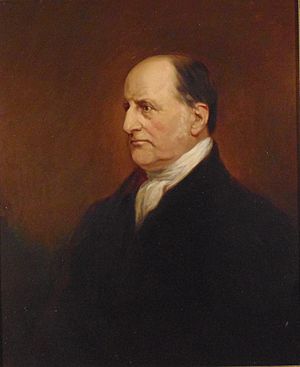Sir Francis Wood, 2nd Baronet facts for kids
Quick facts for kids
Sir
Francis Wood
Bt
|
|
|---|---|

Wood c. 1815, by H. Broughton
|
|
| Born | 16 December 1771 |
| Died | 31 December 1846 (age 75) |
| Burial place | Hickleton |
| Occupation | Landowner High Sheriff of Yorkshire Vice-Lieutenant of the West Riding of Yorkshire |
| Known for | Political influence |
| Political party | Whigs |
| Children | Charles Wood, 1st Viscount Halifax |
Sir Francis Lindley Wood, 2nd Baronet (born 16 December 1771 – died 31 December 1846) was an important person in Yorkshire, England. He owned a lot of land and had a big impact on politics in the 1800s.
Francis was born the son of a Royal Navy officer. He became a Baronet in 1795 when he inherited the title from his uncle. A Baronet is a special title, like a knight, that can be passed down in a family.
He lived in several large homes, including Bolling Hall, Hemsworth Hall, and Hickleton Hall. Francis was a member of the Whig political party. He was a close friend of Lord Fitzwilliam, a powerful Whig leader.
Francis supported many Whig politicians, including Lord Fitzwilliam's son, Lord Milton. He strongly believed in making changes to society. He supported ending slavery and helped pass the Reform Act 1832. This law changed how people voted in Britain.
In 1814, Francis was the High Sheriff of Yorkshire. This was an important local role. In 1819, he became Vice-Lieutenant of the West Riding of Yorkshire.
Contents
Early Life and Estates
Francis Lindley Wood was born on 16 December 1771. His father was Captain Charles Wood of the Royal Navy. His mother was Caroline Barker. Francis was the nephew of Sir Francis Wood, 1st Baronet, who was a very rich merchant.
Francis lived at his family's main home, Bolling Hall, in Yorkshire. When his uncle died in 1795, Francis inherited his Baronet title. He also received his uncle's estates, which included land in Monk Bretton.
In 1790, Francis sold some land from Bolling Hall. He sold it to a company called Bowling Iron Works. They used the land to mine for coal and iron. This mining changed the look of his property a lot. Because of this, Francis moved to Hemsworth Hall. This property was left to him by another uncle, Reverend Henry Wood. Eventually, he sold all of the Bolling estate to the mining company.
In 1828, Francis bought Hickleton Hall. The previous owners lost their money when a local bank failed. Francis moved from Hemsworth to Hickleton in 1830. He also owned land in London. In 1807, he used some of this land to build Nelson Square. This area is near Blackfriars Road.
Political Influence
Francis Wood was never a member of parliament himself. However, he was one of the most important Whig activists in his area. Because of his uncle's connections, he was also a close friend of the Whig leader Lord Fitzwilliam. He was also close with Lord Fitzwilliam's son, Lord Milton.
Francis used his friendship with Lord Fitzwilliam to help his own son, Charles. In 1826, he helped Charles win a seat in parliament for Great Grimsby. This cost Francis about £4,000. Francis and his son wrote letters to each other often. Through these letters, Francis encouraged his son to support important changes. He wanted to end slavery. He also wanted to get rid of the Corporation and Test Acts. These old laws limited the rights of people who were not part of the Church of England.
Francis also helped other politicians. In 1806, he supported Walter Fawkes. Fawkes successfully won the seat for Yorkshire. The next year, Francis supported Lord Fitzwilliam's son, Lord Milton, for the same seat. Milton won by only 187 votes.
Francis was a strong supporter of the Reform Act 1832. This act made big changes to the voting system in Britain. He organized a large event in York to show his support for it. Because of his efforts, he became known as the "Father of Reform in the West Riding."
Public Service and Hobbies
Even though he did not want to be a member of parliament, Francis held important jobs in his county. In 1814, he became the High Sheriff of Yorkshire. In 1819, he was made Vice-Lieutenant of the West Riding of Yorkshire.
In his free time, Francis enjoyed sports. He kept hounds for hunting at Bolling Hall. He was also a vice-president of the Yorkshire Philosophical Society. This group studied science and nature.
Francis Wood died on 31 December 1846, when he was 75 years old. He was buried in Hickleton.
Family Life
Francis Wood married Anne Buck on 15 January 1798. Anne was the daughter of Samuel Buck, a judge in Leeds. Anne died on 11 January 1841.
Francis and Anne had three children:
- Charles Wood, 1st Viscount Halifax (born 20 December 1800 – died 8 August 1885). He became a politician and was given the title of viscount in 1866.
- Anne Wood (born 27 January 1803 – died 24 June 1863). She married John Walbanke-Childers in 1824.
- Samuel Francis Wood (born 1 August 1809 – died 22 April 1843).
Images for kids
 | Jessica Watkins |
 | Robert Henry Lawrence Jr. |
 | Mae Jemison |
 | Sian Proctor |
 | Guion Bluford |


